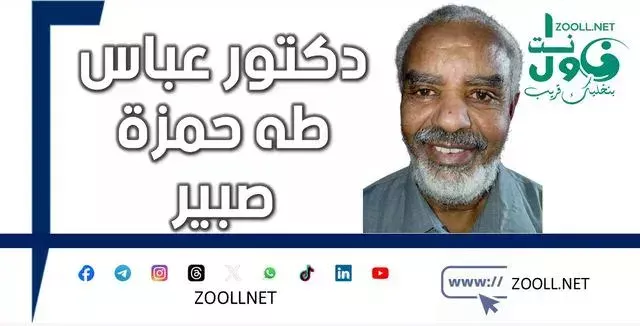Thank you, Zakat Office, Gedaref State ✍️ Dr Abbas Taha Hamza Sobeir

*Written by Dr. Abbas Taha Hamza Subir
*University of Khartoum*
In the past few days, and regarding the enormous efforts made by the Zakat Office in Gedaref State, I read what was written by the veteran journalist, the eminent Professor Ahmed Babakir Al-Makabrabi, defender of the oppressed and bulldozer for sweeping away corruption in the civil service, as I have called him in other articles published in several publications….
All these efforts of the Zakat Office are appreciated and, God willing, in the balance of the good deeds of those who participated in their implementation, but in my opinion, they all remain palliative treatments for the problem of poverty, which has become the dominant characteristic of the majority of Sudanese citizens… Therefore, it is necessary to think outside the box in striving to eradicate the disease of poverty in society, through… Many programs, including but not limited to…
First…. Solving the water problem of Gedaref by joining the official and popular efforts and the Zakat Office according to the details and plan that I had previously proposed as part of my proposals to the Governor of Gedaref State regarding sustainable development in Gedaref State… Availability of pure water Water inside homes reduces the risks of diseases resulting from the consumption of contaminated water and thus reduces the water bill, especially for those most vulnerable to diseases, such as children, women and the elderly…
The availability of water inside the houses allows the citizen to escape the cycle of poverty to achieve food self-sufficiency and perhaps achieve well-being by applying my very successful experience in productive housing, which is replicable, and which I have mentioned in detail and is included in my proposals to the Governor of Gedaref State regarding the sustainable development of Gedaref State…
Secondly…. That the Zakat Office, in coordination with the official authorities of the state, should work according to the wisdom that… the poor person has the net to catch his fish sustainably instead of giving him a fish to eat daily… this is a wise approach to eradicate poverty and bring the poor out of the cycle of poverty and bring them into the realm of self-reliance so that they themselves can become, in the future, payers of zakat instead of deserving recipients… This can be done by financing small individual projects, and better still, by financing cooperative societies at the neighborhood level and the functional and professional sectors of the professional service. The activity of these cooperative societies includes the agricultural, commercial and industrial fields. The success of such projects can help to address the underemployment of the civil service resulting from the accumulation of arbitrary appointments in ministries through corruption and nepotism, which have created this huge army of unemployed people in government offices who have no contribution to production, but are content with gossip, palace advice and conversations about politics, society and other destructive practices, and all this is financed from the treasury of the Sudanese people, who are burdened by taxes and feed on the expense of their abject poverty, all these armies. drawn from the unemployment of the civil service, which suffers from zero positive thinking and creative desertification…
With the success of cooperative societies, it is possible to address underemployment in the public sector by encouraging and motivating workers and employees to take early voluntary retirement and by adopting financial incentives to free the army of unemployment in the public sector by encouraging them to take voluntary retirement. present their resignations by absorbing them in successful production projects…
All these ideas mentioned above and others are included in my proposals to the Governor of Gedaref State regarding the achievement of sustainable development, and I hope that the Governor will examine their details and work to adopt those that are useful….
With all my thanks and appreciation
Dr. Abbas Taha Hamza Sobeer
University of Khartoum





